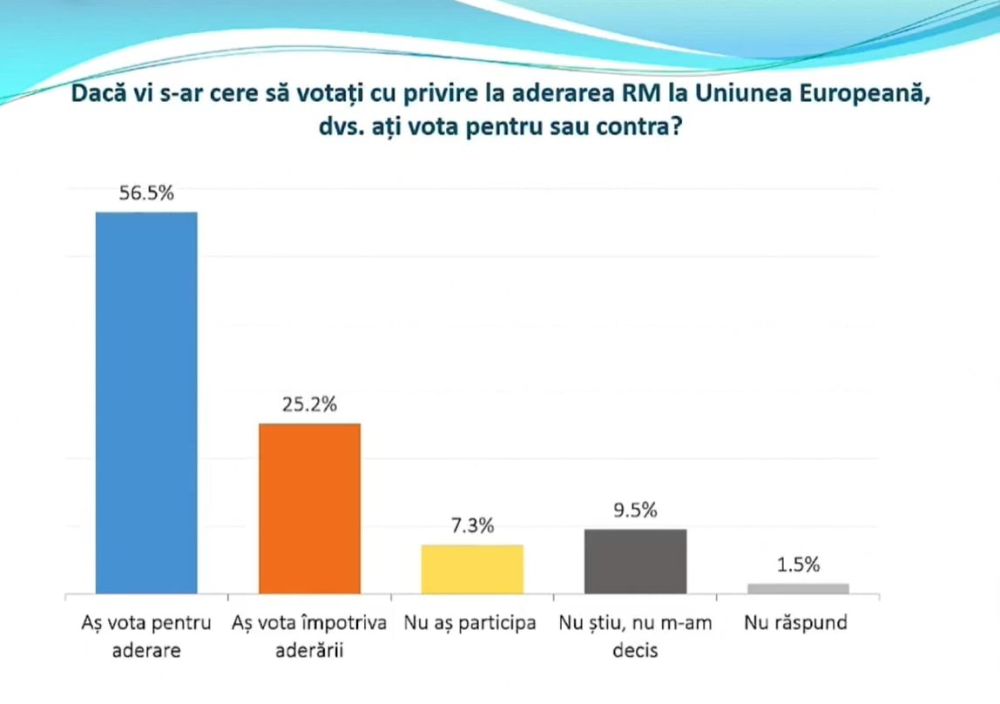In April 2024, the Constitutional Court in Chișinău decided that the referendum on joining the European Union is constitutional and can take place on 20 October 2024. This decision was interpreted in a speculative way by sources who misinformed and speculated, pro-East politicians amplifying the distribution of messages ‘demonizing’ the West and the European Union (EU). These narratives have already been appearing with the approaching European parliamentary elections this summer.
The elections' scarecrows: “Romania will swallow Moldova”
In 2024, however, the message of anti-Western narratives will be stronger, including from pro-Kremlin sources, because it is an election year: in June, the EU held the European parliamentary elections, and on 20 October, Moldova is to hold presidential elections and a referendum on the country’s adherence to the European Union. These events are related because almost 1/3 of Moldovan citizens also hold the citizenship of an EU member state (mostly Romanian citizens), and disinformation messages against the EU target Romania as well.
For instance, recently, the Bashkan of Gagauzia Evghenia Gutul, on the YouTube channel “Соловьёв LIVE”, moderated by pro-Kremlin propagandist Vladimir Soloviov, said that the majority of Moldovans were against Moldova's union with Romania and EU membership. And this was after the Russian propagandist had said that “the chances of Romania swallowing Moldova are high" and "it is already obvious that this is happening." Their claims are false, and were also refuted by the portal Stopfals.md.

Poll: Majority of Moldovans would vote for the country to join the EU
This false information is also contradicted by numbers. According to a survey recently presented by WatchDog Community and CBS Research, 56.5% of Moldovan citizens would vote for EU membership; 25.2% of respondents would vote against membership; 7.3% would not participate; 9.5% are undecided, while 1.5% refused to answer.
New Anti-Western Narrative: Abandoning Unified Political Dome of the European Union
Mădălin Necșuțu, investigative journalist and fact-checker believes that this year is crucial for the Republic of Moldova, and the great battle of disinformation will be fought on social networks, using materials created by artificial intelligence.
"As the presidential elections and a referendum on Moldova's accession to the EU approach, Russian propaganda will intensify with the ultimate goal of overthrowing the pro-European power in Chișinău. We have seen what significant resources the pro-Russian forces have allocated to the November 2023 local elections through the fugitive oligarch Ilan Shor. It was also when we saw that they first tested the deep fake videos targeting President Maia Sandu. If they were tested then, now Russian propaganda has moved on to producing and distributing deep fakes in larger quantities on social networks, especially Telegram and TikTok, where content moderation is laxer compared to Western social networks Facebook, Instagram, YouTube, etc.," the journalist says.
Necșuțu also mentions that disinformation has evolved in the context of this year's elections. "As for the narratives about the EU, while in previous years the central narrative of the West as morally decadent and Russia as the champion of the conservative 'true faith' was peddled, the emphasis has shifted to the sovereignty of European states, which must abandon the unified political dome of the European Union. The idea of sovereignty is being pushed very hard in the context of the European Parliament elections to be held in June. This is just one example. Russia is now also pushing another narrative very hard, and namely, of involving Moldova in the war in Ukraine because of Western interests and pro-European leadership. It is trying to equate EU membership with Moldova's involvement in the war. In general, Russian propaganda accents are flexible and molded to the everyday context of events. Even if the main narratives remain the same, the meta-narratives (sub-narratives) change according to the context and the specific hybrid war operations Russia is thinking about at each stage," the journalist concludes.
Anti-Western Campaign in Georgia: Another State, Same Pro-Kremlin Narratives
In 2022, the European Council decided to grant Moldova and Ukraine the status of candidate countries for accession to the European Union, and in 2023 this status was also granted to Georgia. In order to undermine confidence in the EU, all three countries are victims of Kremlin propaganda, with the West being demonized through various disinformation narratives: disparaging the West in favor of the East.
In May 2024, the Georgian parliament adopted the controversial "foreign influence" bill. According to Georgian journalist Tamar Kintsurashvili, executive director of the Georgian Media Development Foundation, an organization that runs the fact-checking portal MythDetector.ge, Georgia's European path is in danger, and the same narratives about the EU as an enemy will be perpetuated in the near future. “I think that the ruling party, similar to pro-Kremlin actors, is already engaged in an anti-Western campaign. EU integration will be sabotaged by the adoption of this law, because being part of the European family means obligations, but with Russia and China they have no such obligations," the Georgian journalist says.
After the adoption of this law, Georgia's accession to the European Union was officially "stopped", the decision being taken at the Summit on 27 June 2024.
 Photo: Protests in Tbilisi. Photo credit: Tamar Kintsurashvili
Photo: Protests in Tbilisi. Photo credit: Tamar Kintsurashvili
In Moldova, on October 20, the presidential elections will take place. Parliamentary elections are scheduled to be held in Georgia on 26 October 2024. Regardless of whether it is Moldova or Georgia, in the period when pro-Kremlin sources are increasing many speculations and disinformation about the European Union, it is necessary for the voting public to check the information from several sources, such as in the voting booth, in order to make an informed choice. Both countries have long been "victims of pro-Kremlin propaganda". In this time, the disinformation messages will continue to be disseminated both by the politically controlled media and by politicians with pro-Russian views.
Image source: EuvsDisinfo
Author: Lilia Zaharia, TI Moldova
